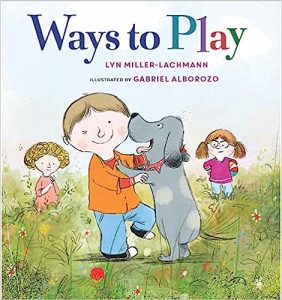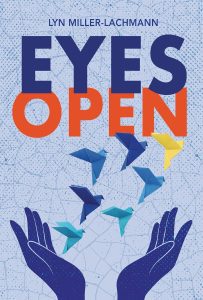Giving Characters Agency in Restricted Spaces
In the past, I’ve written about Passive Protagonist Syndrome, a reason many manuscripts never see the light of day — or often enough the words “THE END”. Basically, Passive Protagonist Syndrome occurs when the main character is primarily an observer without taking action to drive the story forward. Taking action can affect the world around the protagonist, or it can change the protagonist’s own situation and relationships with others in their life. Action does not have to be earth-shattering to make for a good story.
 By their very nature, children’s books — especially those for very young children — face a challenge. The younger the child, the more limited their world, and the greater their dependence on adults. That’s one reason why many picture books feature animals or inanimate objects as protagonists. For instance, a bear — even (or especially) a childlike bear such as the one in my friend Sandra Nickel’s duology Big Bear and Little Fish and Bear’s Big Idea — can live on its own and go on adventures in a way that a six-year-old child can’t. I faced this challenge in writing my own picture book, Ways to Play, which features a human protagonist on the autism spectrum and draws textual and visual inspiration from the world of Peanuts, where adults were absent and kids attempted to solve their own problems with varying levels of success.
By their very nature, children’s books — especially those for very young children — face a challenge. The younger the child, the more limited their world, and the greater their dependence on adults. That’s one reason why many picture books feature animals or inanimate objects as protagonists. For instance, a bear — even (or especially) a childlike bear such as the one in my friend Sandra Nickel’s duology Big Bear and Little Fish and Bear’s Big Idea — can live on its own and go on adventures in a way that a six-year-old child can’t. I faced this challenge in writing my own picture book, Ways to Play, which features a human protagonist on the autism spectrum and draws textual and visual inspiration from the world of Peanuts, where adults were absent and kids attempted to solve their own problems with varying levels of success.
 In writing my novels for teens, I faced a very different kind of challenge. All three of my YA novels (four if you consider Surviving Santiago, the sequel to Gringolandia) feature teenagers growing up under dictatorships or living with the trauma from dictatorship. In general, teenagers are experiencing a wider world, in the process of separating from their parents and finding their place within their peer group and the wider society. But when teenagers grow up under dictatorship, their agency is far more limited. They may not be able to choose their profession or whether to continue their education, for instance. At the beginning of Torch, readers learn that Pavol has been denied admission to university and ordered to report to work as a coal miner after graduating from high school. Even though he’s worked hard and received top grades, his participation in a protest has led to this punishment. And in Eyes Open, Sónia’s possibilities in life have been limited from the moment of her birth by the fact that she is female and not from a family in her country’s ruling elite. By their very nature, dictatorships infantilize the people who live under them. The ruler, or ruling party, monitors their private behavior and communications, restricts access to a wide range of media and ideas, and sets up laws for what the individual can and can’t do, including restrictions on travel. The “adventures” that my characters in Torch embark on in the course of the novel are, in fact, prohibited. They are real-life runaway bunnies.
In writing my novels for teens, I faced a very different kind of challenge. All three of my YA novels (four if you consider Surviving Santiago, the sequel to Gringolandia) feature teenagers growing up under dictatorships or living with the trauma from dictatorship. In general, teenagers are experiencing a wider world, in the process of separating from their parents and finding their place within their peer group and the wider society. But when teenagers grow up under dictatorship, their agency is far more limited. They may not be able to choose their profession or whether to continue their education, for instance. At the beginning of Torch, readers learn that Pavol has been denied admission to university and ordered to report to work as a coal miner after graduating from high school. Even though he’s worked hard and received top grades, his participation in a protest has led to this punishment. And in Eyes Open, Sónia’s possibilities in life have been limited from the moment of her birth by the fact that she is female and not from a family in her country’s ruling elite. By their very nature, dictatorships infantilize the people who live under them. The ruler, or ruling party, monitors their private behavior and communications, restricts access to a wide range of media and ideas, and sets up laws for what the individual can and can’t do, including restrictions on travel. The “adventures” that my characters in Torch embark on in the course of the novel are, in fact, prohibited. They are real-life runaway bunnies.
 So how to give agency to teens living in these very restricted circumstances, where the government deliberately makes people passive? For me, it was a trial-and-error process because I wrote another YA manuscript before Eyes Open, featuring a different protagonist who failed to overcome Passive Protagonist Syndrome. If you’ve read the verse novel, you may have caught the cameo appearance of Rosália, one of the older sisters of Sónia’s rebellious boyfriend. Although she tried to keep her younger brother out of trouble, Rosália was primarily a narrator of other characters’ struggles, including those of poetry-writing Sónia (of whose actions she strongly disapproved). While most of the girls, including Rosália, chafe against their restricted lives, Sónia struggles the most. At first, her actions consist of writing poetry to honor her boyfriend in prison and trying to identify the snitches who landed him there and later cost her extended family the restaurant that had been their livelihood for three generations. But as she toils in a hotel laundry after being forced to drop out of school, she learns both the power and the price of taking real action against the regime and its many surrogates.
So how to give agency to teens living in these very restricted circumstances, where the government deliberately makes people passive? For me, it was a trial-and-error process because I wrote another YA manuscript before Eyes Open, featuring a different protagonist who failed to overcome Passive Protagonist Syndrome. If you’ve read the verse novel, you may have caught the cameo appearance of Rosália, one of the older sisters of Sónia’s rebellious boyfriend. Although she tried to keep her younger brother out of trouble, Rosália was primarily a narrator of other characters’ struggles, including those of poetry-writing Sónia (of whose actions she strongly disapproved). While most of the girls, including Rosália, chafe against their restricted lives, Sónia struggles the most. At first, her actions consist of writing poetry to honor her boyfriend in prison and trying to identify the snitches who landed him there and later cost her extended family the restaurant that had been their livelihood for three generations. But as she toils in a hotel laundry after being forced to drop out of school, she learns both the power and the price of taking real action against the regime and its many surrogates.
Does Sónia change the world? Does she bring down the dictatorship like Katniss in the Hunger Games trilogy? No, and that wouldn’t be accurate at the time this novel is set (which is why historical novels set in dictatorships tend to take place near the end of those regimes). But there are ways of showing character agency even if the protagonist doesn’t change the world. Maybe they save the life of a friend, or obtain a small concession that turns out to have greater impact later on. Or if they can’t bring freedom to their country, they can find freedom for themselves. Maybe, even if “evil wins,” the protagonist lives to fight another day, and at the end of a harrowing adventure, that’s all the reader can hope for.







Agency is a great topic and is especially compelling in areas where restrictions are the norm. You showed Sónia’s agency in a believable fashion. Everyone can’t be a Katniss. Sometimes it takes several iterations of agency in people before big changes happen.
In speculative novels, it’s easier to depict teen characters with the agency to change society. Throughout history, very few teenagers have played that role. Most of those paid with their lives and their impact was only seen many years later. Jan Palach, the 20-year-old whose self-immolation inspired Torch, was one of those examples. A commemoration of his death 20 years later was brutally repressed by the police, but protests against the imprisonment of dissident leader Vaclav Havel (who was far from a teenager) snowballed into the toppling of the regime.
How eerily relevant to these times. I started out reading this post as a writer and finished reading it as a human. <3
Thank you, Katia! Coming from you especially, that means a lot to me.